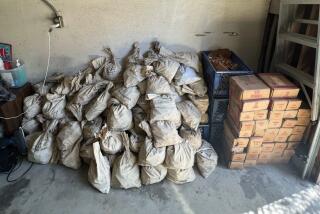Franklin Mint Collected by New Owners
- Share via
M. Moshe Malamud received a Franklin Mint Monopoly set as a bar mitzvah present more than 20 years ago. He liked it so much he bought the company.
Malamud and a group of other investors, including Hollywood producer and former Vibe magazine co-owner David Salzman, have acquired the collectibles company from Beverly Hills power couple Stewart and Lynda Resnick. The purchase price was not disclosed.
The Franklin Mint was founded in 1964 by Joseph Segel, father of the nation’s largest home-shopping network, QVC Inc. The company originally made its mark producing and selling collectible coins commemorating such events as the 1969 Apollo moon landing.
In recent years, the emphasis has shifted to die-cast models of airplanes and automobiles, custom jewelry and porcelain figurines of celebrities such as Princess Diana.
The new owners said Tuesday that they hoped to expand the Aston, Pa.-based company at a time when the collectibles market was just beginning to recover from its steep downturn at the end of the last decade.
“We’re in a growth mode,” said Malamud, who is chairman of the Morgan Mint in Hicksville, N.Y., and will assume the same title with the Franklin Mint.
The company has product licensing agreements with about 280 parties, including General Motors Corp., the Smithsonian Institution and the estates of such figures as John Wayne and Elvis Presley.
“We live in a celebrity-fixated culture,” Salzman said in explaining the company’s move away from historical memorabilia. “In the 21st century, it’s more Marilyn Monroe and Elvis Presley and Princess Diana than it is Woodrow Wilson, FDR, Ronald Reagan and JFK.”
Current offerings include a die-cast 1971 Plymouth Road Runner for $120, a miniature Ford Model T assembly line in pewter for $1,250 and a replica of a Faberge egg for $5,000. The lavish commemorative Monopoly game retails for $500 and a Princess Di figurine goes for $195.
Salzman has ties to the music industry through his association with producer Quincy Jones, with whom he founded the hip-hop magazine Vibe. He also is known as the executive producer of the sketch comedy show “MADtv” and producer of the 1997 Shaquille O’Neal movie “Steel.”
He hopes to strike licensing agreements with record companies that will add icons of the music world to the Franklin Mint product line. The new owners also hope to reach younger buyers by ramping up TV and Internet marketing efforts.
Plans are in the works for a series of collectibles geared to the 30th anniversary of Elvis’ death next year.
The Franklin Mint’s annual sales reached $1 billion in 2000 as the company rode the crest of the collectibles wave. They faltered in subsequent years as the boom faded, but have now stabilized at a level that Malamud declined to disclose. The privately held company has always been profitable, he added.
The investors, having heard that the Franklin Mint might be on the block, opened negotiations with the Resnicks in 2002.
“Once they decided they would sell, they were in no hurry until they found the right adoptive parents to take it over and take it to a new, higher level,” Salzman said. The sale was completed Aug. 31 but wasn’t announced until Tuesday.
Stewart Resnick, a corporate farmer, philanthropist and art collector who acquired the Franklin Mint in 1986 for $167 million, could not be reached for comment Tuesday. His net worth has been estimated at close to $1 billion.
The Diana, Princess of Wales Memorial Fund sued the Franklin Mint in 1998, saying it was selling unauthorized memorabilia. The company countersued and the fund settled two years ago, agreeing to pay $25 million to charitable causes.
The collectibles industry, which encompasses Beanie Babies, limited-edition dinner plates and oil paintings that cost thousands of dollars, fell on hard times when speculators bid prices up to unrealistic levels, inviting a crash.
When the downturn came, business slowed so much that the industry canceled its annual convention earlier this decade. The market is staging a comeback, and a trade show is set for September in Dallas.
“We discourage people from thinking of these items as an investment,” said Linda Kruger, executive director of the Collectors’ Information Bureau, a trade group. “We want people to collect because they like to have these items around them.”
*
More to Read
Inside the business of entertainment
The Wide Shot brings you news, analysis and insights on everything from streaming wars to production — and what it all means for the future.
You may occasionally receive promotional content from the Los Angeles Times.









